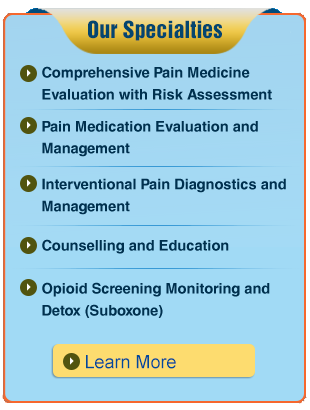PAGE TITLE
Patient Education
TEXT AREA
What is Chronic Pain?
Over 100 million Americans like you have chronic pain. Whether it is caused
by arthritis, migraines, fibromyalgia, or a bad back. Chronic pain, by
definition, is pain that can last for weeks, months or years and it can
change your life. Never ignore pain. Whatever the intensity mild, moderate
or severe, pain should never be ignored. Evaluation and treatment are a
phone call away.
What causes pain ?
Pain results from signals sent from your nerves to your brain. It can serve
as an alarm or a warning, that you're stepping on a nail or touching a hot
stove. However, sometimes the signals keep firing and the pain continues,
that's when it becomes chronic.
Don't overuse Over-the-Counter Painkillers
When it comes to pain treatment, don't do it yourself. Over-the-counter
painkillers such as, acetaminophen, aspirin, and ibuprofen are good for
occasional pain. However, they may be risky if you take them in high doses
or for a long period of time. Always follow the instructions on the medicine
bottle and don't use Over-the-Counter painkillers for more than 10
continuous days, unless a doctor is supervising. Otherwise seek professional
help.
Signs you need Pain Relief
Anybody with frequent or daily pain- even mild pain should see a doctor,
especially if the pain is interfering with your life, limiting your
activities or your ability to work. Keep in mind that chronic pain can creep
up on you. What starts as occasional and bothersome can over time become
serious and disabling. Let us help you !
News from the Dr.'s Desk
Helpful Tips for Living With Chronic Pain
Learn deep breathing exercises or meditation to help you relax.
Deep breathing and meditation are techniques used to help your body relax, which may ease pain. Tension and tightness are reduced from muscles as they receive a quiet message to relax.
Although there are many ways to meditate, the soothing power of repetition is at the heart of some forms of meditation. Focusing on the breath, ignoring thoughts, and repeating a word or phrase -- a mantra -- causes the body to relax. While you can learn meditation on your own, it helps to take a class.
Deep breathing is also a relaxation technique. Find a quiet location, a comfortable body position, and block out distracting thoughts. Then, imagine a spot just below your navel. Breathe into that spot, filling your abdomen with air. Let the air fill you from the abdomen up, then let it out, like deflating a balloon.
Reduce the stress in your life. Stress magnifies chronic pain.
Negative feelings like depression, anxiety, stress, and anger can increase the body's sensitivity to pain. By learning to take control of stress, you may find some relief from chronic pain.
Several techniques can help reduce stress and promote relaxation. Listening to soothing, calming music can lift your mood -- and make living with chronic pain more bearable. There are even specially designed relaxation tapes or CDs for this. Mental imagery relaxation (also called guided imagery) is a form of mental escape that can help you feel peaceful. It involves creating calming, peaceful images in your mind. Progressive muscle relaxation is another technique that promotes relaxation.
Improve chronic pain relief with the natural endorphins by doing exercises.
Endorphins are brain chemicals that help improve your mood while also blocking pain signals.Exercise has another pain-reducing effect -- it strengthens muscles, helping prevent re-injury and increasing pain. Plus, exercise can help keep your weight down, reduce heart disease risk, and control blood sugar levels -- especially important if you have diabetes. Ask your doctor for an exercise routine that is right for you. If you have certain health conditions, like diabetic neuropathy, you will need to be careful about the types of activities you engage in; your doctor can advise you on the best physical activities for you
Cut back on caffeine and alcohol, both can worsen sleep problems.
Pain makes sleep difficult, and alcohol can make sleep problems worse. If you're living with chronic pain, drinking less or no alcohol can improve your quality of life.
Join a support group. Meet others living with chronic pain.
People who have chronic pain understand what you're going through, you feel less alone. You also benefit from their wisdom in coping with the pain.
Consider meeting with a mental health professional. Anyone can develop depression if he or she is living with chronic pain. Pain causes physical and mental disabilities which compromise your well-being. Getting counseling can help you learn to cope better and help you avoid negative thoughts that make pain worse -- so you have a healthier attitude. Asking for help is a sign of strength, not weakness.
Don't smoke. It can worsen your chronic pain.
Smoking can lead to painful circulation problems and increase your risk of heart disease and cancer.
Track your pain level and activities every day.
To effectively treat your pain, your doctor needs to know how you have been feeling between visits. To assess this, keeping a log or journal of your daily "pain score" will help you track your pain. At the end of each day, note your pain level on the 1 to 10 pain scale. Also, note what activities you did that day. Take this log book to every doctor visit -- to give your doctor a good understanding of how you're living with chronic pain and your physical functioning level.
Learn biofeedback to decrease migraine and tension headache pain.
Using biofeedback, it's possible to consciously control various body functions. There is good evidence that biofeedback works -- and it's not hard to learn and master.
Here's how it works: You wear sensors that let you "hear" or "see" certain bodily functions like pulse, digestion, body temperature, and muscle tension. These bodily functions show up as squiggly lines and/or beeps on the attached monitors reflect what's going on inside your body. Then you learn to control those squiggles and beeps. After a few sessions, your mind has trained your biological system to learn the skills.
Get a massage for chronic pain relief.
Massage can help reduce stress and relieve tension -- and is being used by people living with all sorts of chronic pain, including back and neck pain. Message also improves blood flow to body tissues and increases release of endorphins.
Eat a healthy diet if you're living with chronic pain.
A well-balanced diet is important in many ways -- helping with your body's digestive process, reducing heart disease risk, keeping weight under control, and improving blood sugar levels. To eat a low-fat, low-sodium diet, choose from these: fresh fruits and vegetables; cooked dried beans and peas; whole-grain breads and cereals; low-fat cheese, milk, and yogurt; and lean meats.
Find ways to distract yourself from pain may help you enjoy life more.
When you focus on pain or something negative, it makes it worse rather than better. Instead, find something you like doing -- an activity that keeps you busy and thinking about things besides your pain. You might not be able to avoid pain, but you can take control of your life.
















